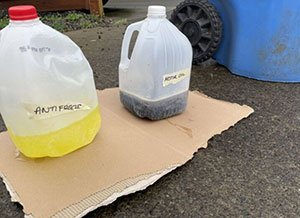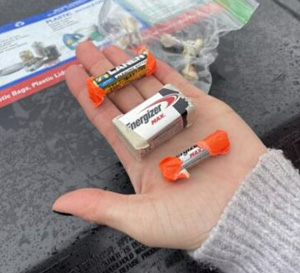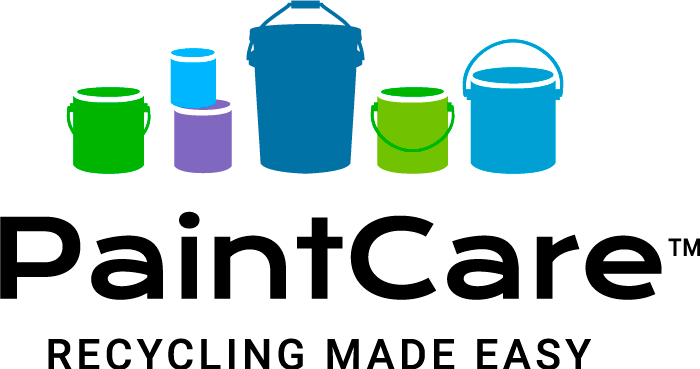Virtually every home contains products that are potentially hazardous if misused or disposed of improperly. It’s important to know how to properly dispose of hazardous materials to protect the safety of your home and the environment. Never pour hazardous wastes down the drain or into the storm drain or place them in the garbage or recycling.
Common household hazardous waste items include paints, pesticides, poisons, cleaners, automotive fluids, medical sharps, inhalers, and medications. Unsure if an item is considered hazardous? Use the RecycleRight app (available on Apple or Android devices) or Recycling A-Z Directory to look up household items and learn about safe disposal methods.
Curbside disposal
There are curbside options for disposing of motor oil, antifreeze and select battery types.
More about curbside household hazardous waste disposal
Household hazardous waste disposal
Clark County residents can dispose of household hazardous waste such as pesticides, poisons, paints, automotive fluids and other harmful chemicals at the three transfer stations in Clark County at NO COST.
Residents can drop off up to 200 pounds or 25 gallons of household hazardous waste at no cost the following locations and times (business-generated hazardous waste is not accepted at these sites):
West Van Materials Recovery Center
6601 NW Old Lower River Road, Vancouver
(360) 737-1727
8 a.m. to 4 p.m. | Friday and Saturday
View live stream of real-time lines
Washougal Transfer Station
4020 S Grant St, Washougal
(360) 835-2500
8 a.m. to 4 p.m. | First and third Saturdays of the month
View live stream of real-time lines
Central Transfer and Recycling Center
11034 NE 117th Avenue, Vancouver
(360) 256-8482
8 a.m. to 4 p.m. | Friday, Saturday, and Sunday
View live stream of real-time lines
Guidelines for dropping off household hazardous waste (HHW):
DO:
- Keep HHW products separate (do not mix).
- Bring products in their original containers when possible.
- Seal products to prevent leaks and spills.
- Keep products away from the driver and passengers, i.e., in a trunk, truck bed, or trailer.
- Keep children and pets away from collection sites and events.
DO NOT:
- Exceed 25 gallons or 220 pounds of HHW at the transfer stations
- Exceed one gallon of nicotine vape products per visit.
- Bring asbestos, explosives/ammunition, or radioactive materials.
Vapes or e-cigarettes
Nicotine vapes and e-cigarette devices can be properly disposed of at various locations across Clark County at no cost. Nicotine vapes can contain hazardous chemicals and batteries that should never be put in the trash or recycling. When heated or damaged, batteries can explode and cause serious harm.
No-cost nicotine vape disposal options in Clark County:
- HHW facilities (quantity limited to 1 gallon per drop-off).
- Locate HHW facilities using the RecycleRight app (available on Apple or Android devices) or on the Recycling A-Z Directory.
Not accepted at these locations:
- Vapes from businesses, schools, government, and non-profit organizations must be managed as Business Dangerous Waste. Learn more.
Vapes containing cannabis can only be disposed by sites authorized to handle controlled substances, such as pharmacies and police departments. Cannabis is a controlled substance regulated in Washington as a pharmaceutical dangerous waste. Learn more.
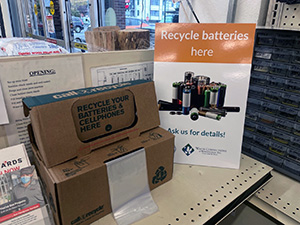 Batteries
Batteries
Dispose of household batteries at no cost through the Clark County Battery Drop-Off program. This program offers safe disposal options for household batteries including lithium-ion (Li-Ion), nickel cadmium (Ni-Cd), nickel metal hydride (Ni-MH), nickel zinc (Ni-Zn), small-sealed lead acid under 5 pounds (SSLA/Pb), lithium primary, alkaline, carbon zinc, heavy duty, button and coin cell batteries, and all cellphones regardless of size, make, model or age.
Locate battery drop-off locations using the RecycleRight App (available on Apple or Android devices), or by using the Recycling A-Z Directory.
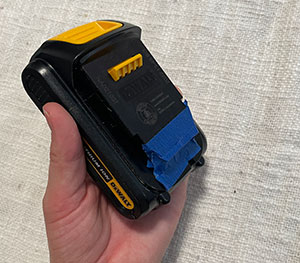 Lithium-ion batteries have a higher risk of igniting during transport and pose a safety concern. Because of these risks, its especially important that these batteries are disposed of safely through a battery drop-off program and are never thrown in the garbage.
Lithium-ion batteries have a higher risk of igniting during transport and pose a safety concern. Because of these risks, its especially important that these batteries are disposed of safely through a battery drop-off program and are never thrown in the garbage.
Batteries should be properly packaged for drop-off. Even “dead” batteries can still spark and ignite dangerous fires. Securely cover battery terminals with tape to prevent the terminals from coming into physical contact with each other. This minimizes fire dangers associated with disposal.
Interested in becoming a battery collection site?
Eligible sites must be in Clark County and include retail stores, campuses, community centers, and other sites accessible to residents. Sites must have on-site staff to monitor collections (churches, multifamily complexes, etc.). There’s no cost to participate.
For more information, contact us by email or at 564.397.7352.


